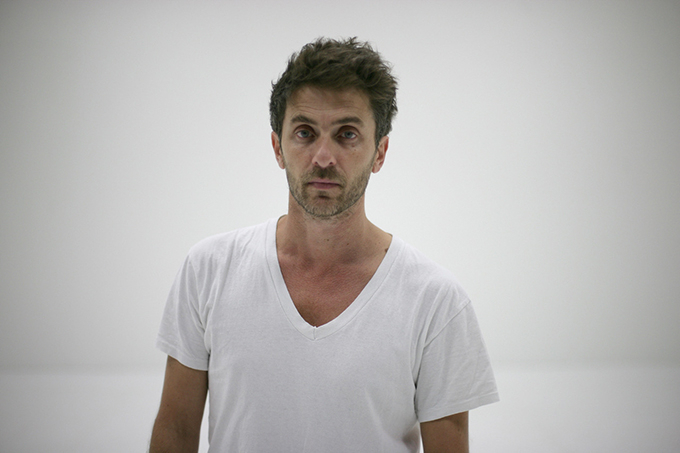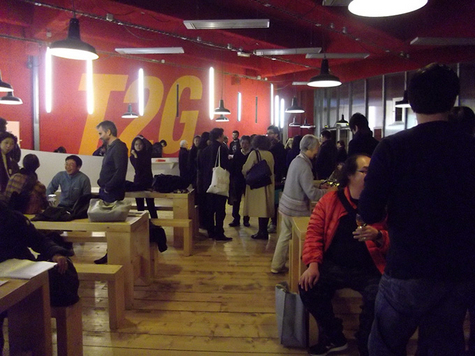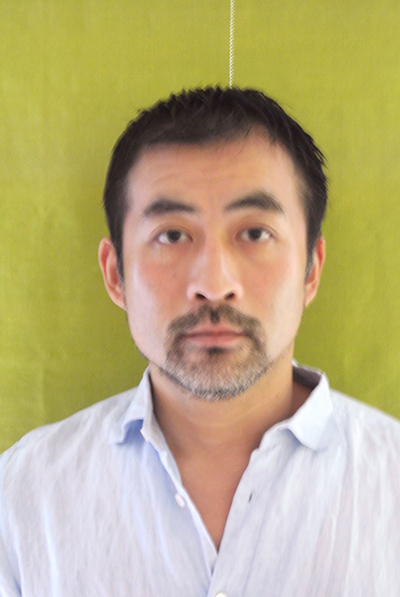Pascal Rambert and Théâtre de Gennevilliers: Driving Forces behind Theatrical Exchange between Japan and France
Shintaro Fujii (Professor, Faculty of Letters, Arts and Sciences, Waseda University)
Born in 1962, Pascal Rambert is one of the most prominent modern French stage directors and playwrights. Based on his personal relationship of trust with Japanese playwright Oriza Hirata, Théâtre de Gennevilliers (T2G), where Rambert served as director from 2007 through the end of 2016, realized numerous joint projects with Komaba Agora Theater, and has become one of the major hubs of contemporary theatrical exchange between Japan and France. Since 2003, Rambert has regularly visited Japan to present his original works and to direct their Japanese language versions at Komaba Agora Theater and other theatrical venues. Parallel to these activities, he has invited numerous productions of contemporary Japanese playwrights such as Oriza Hirata, Toshiki Okada, and Yudai Kamisato to T2G. In January 2017, when Rambert visited Japan for the re-staging of Clôture de l'amour (Love's End) and to participate in Theater Commons Tokyo, a project organized by Arts Commons Tokyo, he gave an interview about his relationship with Japan that spans a period of nearly 15 years.

©Patrick Imbert
The first encounter with Japan
Rambert's first encounter with Japan was in 2003, when he stayed at Villa Kujoyama, a residence facility for artists owned by the Ministry of Foreign Affairs of France in Kyoto, on the strong recommendation of Claude Régy (one of France's preeminent theater directors, born in 1923). During his stay in Kyoto, Rambert had the opportunity to see magnificent Noh productions, and felt that they shared the aesthetic outlook of Régy, so he urged Régy to visit Japan. Later, Régy was invited to Japan by theater director Satoshi Miyagi, and directed his play Intérieur at Shizuoka Performing Arts Center (SPAC).
After establishing working relations with the theatrical world of Japan, Rambert also engaged in projects in numerous other Asian countries and regions, including China, Taiwan, and Thailand. When Robert Lacombe, former director of Institut franco-japonais (current Institut français du Japon - Tokyo) and a stage art producer, took over the position of director of Institut français de Chine, the theatrical exchange between France and China flourished, and Rambert launched multiple projects in China.
Rambert's popularity is not limited to Asia, as he is busy traveling all over the world, but for him Japan remains a special country. One of his most lasting and treasured memories is the performance of his work A (micro) history of world economics, danced in Saitama, Shizuoka, and Miyazaki. Rambert was very surprised by the fact that although it was presented in Japanese and co-directed with Japanese directors, the play was almost the same as the French original. The Miyazaki performance even featured disabled performers who use wheelchairs. Their participation further enhanced the appeal of the play, and later when he staged it at various locations around the world, the experience in Miyazaki became a good example that encouraged him to take on performers with disabilities. This and other wonderful encounters made the end of his Japanese tour a sad and tearful experience for Rambert.
The encounter with Oriza Hirata
Having already seen Oriza Hirata's play Tokyo Notes (2000) directed by Frédéric Fisbach in Paris, Rambert knew about Hirata and his work even before coming to Japan, but initially was hesitant to contact him as Hirata had already been working in concert with Fisbach. When Rambert applied for the position of director of T2G, he proposed, if appointed, to stage works by Oriza Hirata at the theater. This marked the beginning of the exchange between the two theatrical institutions. It was based on an almost unconditional respect for Hirata as a playwright. Upon his visit to Japan, when Rambert went directly from the airport to the theater to see Tokyo Notes, despite the jet lag he was deeply impressed by everything he saw, including Komaba Agora Theater, which Hirata had inherited from his father, and by the story that masterfully depicted the subtleties of emotion. Despite the pronounced difference between the sensitivity and aesthetics of the two artists, or perhaps precisely because of it, a feeling of trust and respect was born between them.
During Rambert's ten-year tenure as director, T2G staged a large number of Rambert's works, and at the same time invited productions of globally-recognized artists, such as Romeo Castellucci, Jan Fabre, Joël Pommerat, Gisèle Vienne, and Richard Maxwell. (According to Rambert, he personally selected all invited artists after watching their works.) The majority of the works invited from Japan were also presented at Festival d'Automne à Paris, a large-scale stage art and music festival held in Paris every year from September through December. This is a testimony to the high recognition of these works by the festival connoisseurs. In most cases it is the organizers of Festival d'Automne who approach theaters about prospective plays to be staged at the festival, but in the case of Rambert, he worked with Artistic Director Marie Collin to come up with specific projects, presented proposals, and thus realized performances of works invited from Japan.

The foyer of T2G at the end of the first day of performances of Citizens of Seoul in November 2016
© Seinendan
The future of T2G
The new director of T2G who took over from Rambert is Daniel Jeanneteau, a leading expert on Japan in French theatrical circles, who has forged deep connections with Japan. This must be more than just a coincidence, and raises hopes that the heritage of cultural exchanges built by Rambert will be passed on to the next generation in a different format.
*This interview was realized with the kind cooperation of Ms. Sachiko Sawai-Nishio, who is a former staff member of the Japan Foundation and in charge of international coordination for Komaba Agora Theater. We would like to express our sincere appreciation for her help.
The projects and initiatives supported by the Japan Foundation PAJ Program include:
Une (micro) histoire economique du monde, dansée (A (micro) history of world economics, danced), a production of Pascal Rambert's play jointly directed by Rambert and three young Japanese directors introduced by Oriza Hirata (T2G, 2010), Tokyo Notes and The Yalta Conference written and directed by Oriza Hirata (Naples, Santarcangelo di Romagna, 2011), and Current Location written and directed by Toshiki Okada (presented at T2G as part of Festival d'Automne à Paris, also presented in Berlin, October 2013). The projects and initiatives supported by the Performances Abroad Program include:
Southeast Asian Tour of Tokyo Notes written and directed by Oriza Hirata (Bangkok, Kuala Lumpur, and Jakarta, June-July 2006), and Tokyo Notes and The Yalta Conference performances at T2G (September 2009).
■ Japanese contemporary plays invited by T2G (by season)
2016-2017 Time's Journey Through a Room written and directed by Toshiki Okada (September 23-27, 2016), +51 Aviación, San Borja written and directed by Yudai Kamisato (October 5-9, 2016), Citizens of Seoul 1909 written and directed by Oriza Hirata (November 8-10, 2016) and Citizens of Seoul 1919 also written and directed by Oriza Hirata (November 12-14, 2016)
2013-2014 Current Location written and directed by Toshiki Okada (October 14-19, 2013)
2012-2013 Three Sisters (Android Version) written and directed by Oriza Hirata (December 15-20, 2012), Sayonara Ver. 2 also written and directed by Oriza Hirata (December 16-20), Anamorphosis written and directed by Philippe Quesne (performed in Japanese by actors of Seinendan, April 22-26, 2013)
2010-2011 Hot Pepper, Air Conditioner, and the Farewell Speech written and directed by Toshiki Okada (October 2-5, 2010), We Are the Undamaged Others written and directed by Toshiki Okada (October 7-10, 2010)
2009-2010 Ryoji Ikeda (Site-specific installation)
2008-2009 Tokyo Notes written and directed by Oriza Hirata (October 10-19, 2008), Five Days in March written and directed by Toshiki Okada (November 17-22, 2008), Sand and Soldiers written and directed by Oriza Hirata (March 18 - April 11, 2009)
■ Works by Pascal Rambert and T2G performed in Japan (by fiscal year)
FY2016 Clôture de l'amour (Love's End) written and directed by Pascal Rambert (re-staging of the Japanese language version, Komaba Agora Theater, December 22-28, 2016, Shikoku Gakuin University Notos Studio January 19-21, 2017)
FY2013 Clôture de l'amour (Love's End) written and directed by Pascal Rambert (Japanese language version, SPAC September 28 and 29, 2013, Knowledge Theater October 5 and 6, 2013, KAAT October 11-14, 2013)
FY2012 Anamorphosis written and directed by Philippe Quesne (Atelier Shunpusha, February 7-11, 2013, KAAT February 13, 2013)
FY2011 Knockin' on heaven's door written and directed by Pascal Rambert (SuperDeluxe, April 19 and 20, 2011), DAIKAIJU EIGA written and directed by Christophe Fiat, Rosa, seulement written and directed by Mathieu Bertholet (Komaba Agora Theater, September 30 - October 5, 2011)
FY2010 A (micro) history of world economics, danced written and directed by Pascal Rambert (Japanese language versions, co-director Junnosuke Tada, Kirari☆Fujimi October 16 and 17, 2010, co-director Jun Ooka, SPAC October 23 and 24, 2010, co-director Conatsu Yoshida, Miyazaki Prefectural Arts Theatre October 30 and 31, 2010)
FY2009 The Art of Theater and With my own hands written and directed by Pascal Rambert (Komaba Agora Theater, November 19-23, 2009)
FY2007 The Beginning of Love written and directed by Pascal Rambert (Japanese language version, Komaba Agora Theater, June 7-10, 2007)
 Shintaro Fujii
Shintaro Fujii
Shintaro Fujii is a professor in theatre studies and cultural policy studies at the Faculty of Letters, Arts and Sciences of Waseda University. He has served as the Supervising editor of Posuto-dorama jidai no Sozoryoku [Creativity in the Postdramatic Age] (Hakusuisha Publishing, 2014), co-translator of Engekigaku no Kyokasho [Textbook in Theatre Studies] (Kokushokankokai, 2009), co-editor of Engekigaku no Kiwazu [Key Words in Theatre Studies] (Perikansha Publishing, 2007), and translator of the play Incendies (Scorched) by Wajdi Mouawad performed at Theatre Tram in 2014/2017.
Related Articles
Back Issues
- 2025.7.31 HERALBONY's Bold Mis…
- 2024.10.25 From Study Abroad in…
- 2024.5. 2 People-to-People Exc…
- 2022.11. 1 Inner Diversity<3> <…
- 2022.9. 5 Report on the India-…
- 2022.6.24 The 48th Japan Found…
- 2022.6. 7 Beyond Disasters - …
- 2021.3.10 Crossing Borders, En…
- 2020.7.17 A Millennium of Japa…
- 2020.3.23 A Historian Interpre…

